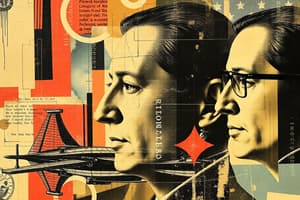Podcast
Questions and Answers
The field of economics encompasses two main branches - macroeconomics and ______.
The field of economics encompasses two main branches - macroeconomics and ______.
microeconomics
Macroeconomics focuses on aggregated measures of performance across entire economies, including key variables such as GDP, unemployment rate, and ______.
Macroeconomics focuses on aggregated measures of performance across entire economies, including key variables such as GDP, unemployment rate, and ______.
inflation
Both areas rely heavily upon mathematical models and statistical techniques to analyze data and draw conclusions applicable across time periods and geographical ______.
Both areas rely heavily upon mathematical models and statistical techniques to analyze data and draw conclusions applicable across time periods and geographical ______.
boundaries
In conclusion, while some might view economics merely as studying markets and numbers, it ultimately seeks deeper insights into human behaviors under conditions of ______ and choice.
In conclusion, while some might view economics merely as studying markets and numbers, it ultimately seeks deeper insights into human behaviors under conditions of ______ and choice.
Its influence extends far beyond financial institutions to everyday life, influencing everything we buy, sell, produce, consume, save, invest, borrow, lend, give away - even our ______ activities!
Its influence extends far beyond financial institutions to everyday life, influencing everything we buy, sell, produce, consume, save, invest, borrow, lend, give away - even our ______ activities!
Flashcards are hidden until you start studying
Study Notes
Introduction to Economics
Economics is a social science that studies how people make decisions, particularly with regards to their spending choices. It looks into factors such as scarcity of resources, allocation of these resources, production of goods and services, distribution of income, trade, and consumption of those goods and services. In essence, economics revolves around understanding behavior and event outcomes when individuals interact within limited resource environments. While often associated with business and finance, economics also plays a significant role in public policy, government administration, and international relations.
Key concepts central to economic theory include the law of demand and supply, equilibrium price and quantity, and the micro-macro dichotomy, which differentiates between market interactions on small scales from large, societal levels. Economic analysis can be used at various levels—from household budgeting to national decision making—to identify efficient solutions under constraints like scarce resources.
Historically, economists were concerned primarily with producing commodities and distributing them fairly among society's members; however, today, this has expanded to incorporating issues related to money, employment, interest rates, inflation, taxes, transportation, housing, utilities, education, health care, and more. This broadened scope reflects increased complexity in modern societies where standard market forces alone do not always guarantee favorable results, thus necessitating intervention by governments and other organizations through fiscal policies, tax structures, and welfare programs.
The field of economics encompasses two main branches - macroeconomics and microeconomics. Macroeconomics focuses on aggregated measures of performance across entire economies, including key variables such as GDP, unemployment rate, and inflation. Microeconomics examines individual markets and consumer behavior within specific sectors. Both areas rely heavily upon mathematical models and statistical techniques to analyze data and draw conclusions applicable across time periods and geographical boundaries.
In conclusion, while some might view economics merely as studying markets and numbers, it ultimately seeks deeper insights into human behaviors under conditions of scarcity and choice. Its influence extends far beyond financial institutions to everyday life, influencing everything we buy, sell, produce, consume, save, invest, borrow, lend, give away - even our leisure activities! Therefore, whether you're managing your personal finances or shaping global policy agendas, economics provides essential tools for navigating and improving every aspect of human existence.
Studying That Suits You
Use AI to generate personalized quizzes and flashcards to suit your learning preferences.



